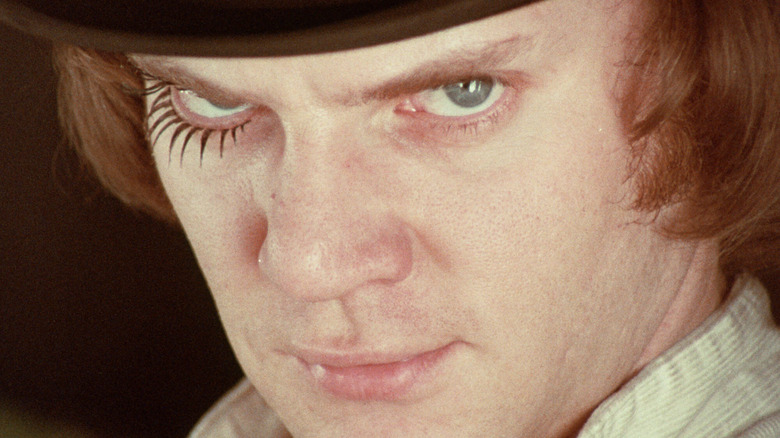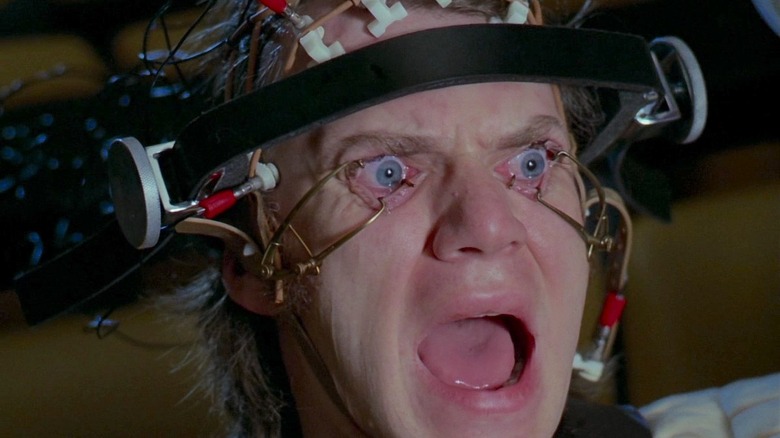How A Clockwork Orange Changed Malcolm McDowell Forever
While many films lose some of their effect over the decades, "A Clockwork Orange" remains one of the most visually arresting movies ever made. At the time of its release, the controversial 1971 Stanley Kubrick film elicited mixed feelings from audiences and — and Anthony Burgess, who wrote the 1962 novel of the same name. The film famously leaves out the novel's final chapter (which was also omitted from American printings at that point in time), thus completely altering the core message Burgess was trying to convey. Interestingly, Burgess himself was initially unsure if the novel's final chapter was necessary or not, which is why he authorized the publication of the American version of the book that ended with chapter 20. However, later in life, he did prefer the original British ending (via anthonyburgess.org) and soured somewhat on the film. Whichever ending you prefer, the deeper questions both novel and film ask about freedom of choice still feel relevant today.
While it is difficult to argue with Kubrick's immense talent and success as a filmmaker, his methods were questionable. His treatment of Shelley Duvall in "The Shining" was abusive and while the movie is considered a classic, the ends certainly don't justify the means. Duvall wasn't the only actor whose life was changed by Kubrick. "A Clockwork Orange" star Malcolm McDowell also had a very traumatic experience working with the auteur. An experience that literally left the actor (temporally) blind.
Eyes Wide Open
McDowell told The Guardian that in order to prepare for the role of Alex, Kubrick made him watch "horrendous films" every day for months. This speaks to the degree of realism Kubrick was hoping for in the film and it was not a comfortable experience for McDowell. Even the scene in which the actor had someone spit directly into his face was one that Kubrick had them shoot many, many times. Aside from that, McDowell cracked several ribs during one of his onscreen beatings.
There are plenty of iconic scenes in "A Clockwork Orange," but perhaps none so much as Alex undergoing the Ludovico Technique. This is a brutal form of aversion therapy in which Alex's eyes are held open and he is forced to watch violent images play out on screen. All the while, he is being pumped full of drugs designed to make him feel both nauseated and terrified by the examples of "ultraviolence" that had previously made him feel so much joy.
According to McDowell, when Kubrick showed him a picture of what he planned to do to the actor, his response was, "Hell, no!" McDowell further explained:
"So he brought in a doctor to anaesthetise my eyes. But most eye operations are done with the patient lying on their back, not sitting up watching videos. When we shot it, the lid-locks kept sliding off my eyelids and scratching my cornea. When the anaesthetic wore off, I was in such pain I was banging my head against a wall. But Stanley was mainly concerned about when he would be able to get his next shot."
McDowell was temporarily blinded by the experience. The actor also told NME that even after that horrific incident, Kubrick made him do it again in order to get another closeup of his eye. And McDowell wasn't the only one on that set who struggled with Kubrick's methods. In what is probably the most disturbing scene in a movie full of them, Alex and his fellow droogs terrorize Frank Alexander (Patrick Magee) and his wife (Adrienne Corri) in their home as Alex belts out "Singin' in the Rain" (the song was ad-libbed by McDowell himself). Cori stated:
"For four days I was bashed about by Malcolm and he really hit me. One scene was shot 39 times until Malcolm said: 'I can't hit her anymore!'"
Much like Burgess' evolving emotions about "A Clockwork Orange," Malcolm McDowell didn't always love the film that made him so famous. He resented the movie for years before accepting that it was "a masterwork." The film may indeed be a masterpiece, but much of the suffering we saw onscreen was very real.

